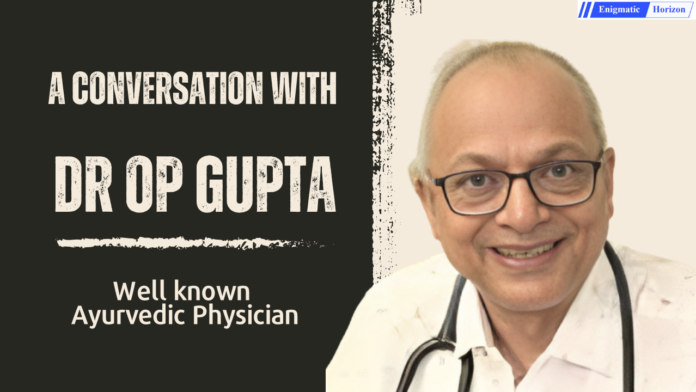Robin Bhuyan (Editor-in-chief)
Mohsin Khaiyam (Senior Sub-editor)
Naba Kumar Sharma
Dr. Om Prakash Gupta is one of the most veteran Ayurvedic physicians in the North East. Previously, he was also a Professor at Assam Ayurvedic College. Let us have a chat with Dr. Gupta, about his career, his views on Ayurveda and holistic health sciences, and how we can take them up to the next level, to give a better shape to humanity.
Why did you choose Ayurveda practice as your profession?
While this is a common question as many wonder why I chose to be an Ayurvedic doctor, it started right after my 12th standard exams. Like others, I too wanted to be a doctor and had attempted the PMT (Pre-Medical Test) thrice and in all these attempts, I failed to secure a seat by 1-3 marks. However, I still had the wish to become a doctor and my father even had the same will. My father followed Gandhian principles, and so he was never much interested in making me an allopathic doctor and he thought of making me a doctor based on the Indian traditional system. He wanted me to follow Ayurveda as well as the traditional Indian medicine system based on our culture. My father who had been a highly qualified person in the 1940s had given up a luxurious life as he followed Gandhi. Keeping these in mind, he suggested I join an Ayurvedic college after I could not qualify for the PMT exam. I completed my BSc when I joined the Ayurvedic College. Even the faculty were surprised and stated that my qualifications were relatively high as compared to that time. They even enquired if I was actually interested in studying it properly.
So how did things continue?
I topped my class each year after I joined the Rishikul Ayurveda College, Haridwar. I even treated my father after completing my education. I eventually did my PhD in Ayurveda after getting my MD. Eventually, I came to Assam after I was appointed as a teacher at the Ayurvedic College in Jalukbari.
What were the posts that you held during your career?
I held multiple posts including that of a lecturer as well as assistant professor and eventually professor. I retired in 2012. What makes me happy was that I was able to initiate new courses in the college. Later, I became the first dean of the Srimanta Sankaradeva University of Health Sciences. I also held multiple other positions but now I am here practicing Ayurveda in my own private chamber after retirement.
Western medicine has its importance, as we all know, but recently, we can see that Ayurvedic ways are getting importance as well in the past few years. What do you have to say about this?
I feel both have equal importance. Allopathy science has made several developments in terms of surgical procedures. Because of these surgical procedures, Allopathy has seen its growth. However, it is only through Ayurvedic ways that one can cure lifestyle diseases. People across the world are turning towards Ayurvedic methods to treat such lifestyle-related diseases. This is solely because Ayurvedic medicines do not have any side effects. Allopathy should be preferred, in cases when there is an emergency.
So what about reactions or side effects?
I have never seen any toxic reactions to Ayurvedic medicines. Since all medicines are herbal and well-refined, there are no side effects. That is the biggest advantage of Ayurveda, in my opinion.
Do you feel that Ayurveda is getting better and advancing over time?
Definitely. People who were suffering from lifestyle diseases and auto-immune diseases, have now been able to find relief through Ayurveda. This is why the popularity of Ayurveda is increasing every day. We are seeing more and more experts in the field of Ayurveda who are doing wonderful work in this field. Even people like Swami Ramdev and Sri Sri Ravi Shankar are playing a huge role in promoting both Yoga and Ayurveda, not just in India, but all over the world.
How can Ayurveda help a common person stay healthy and free from diseases?
The science of Ayurveda lets us know which activities to perform and which to avoid during the daytime, as well as at night. It also lets us know which foods to take and which foods to avoid, during a particular season. Today, people consume all kinds of food, at any time, without considering how strong or weak their digestive capacity is. This is why people fall sick. Ayurveda advises us to choose our food and actions consciously.
Can you emphasize about Vat, Pit and Kaph, the science on which Ayurveda is based on?
Whatever is present in the universe is also present in our bodies. Vat refers to Vayu or Air, Pit refers to Agni or Fire, and Kaph refers to Water energy. Imbalance in these three doshas leads to majority of diseases.
The government is spending a huge amount of money opening allopathic colleges and hospitals. But the same emphasis is not being put in Ayurvedic colleges or hospitals. There is only one Ayurvedic college. What would you say about this?
I feel the government is definitely putting efforts to promote Ayurveda. The current AYUSH minister Sarbananda Sonowal is also considering opening Ayurvedic colleges, one in Majuli and one in Dudhnai.
What would you comment about other kinds of “alternative medicine” such as Homeopathy, Reiki, Unani, Acupressure, etc.?
There are hundreds of kinds of traditional medicine, and they help us immensely in physical and psychological well-being.
Do you feel that Yoga and meditation should be made compulsory in educational institutions?
Definitely. Along with Yoga and meditation, we also need to make preventive healthcare compulsory in all educational institutions. This needs to be done at the earliest!
Dr. OP Gupta can be contacted at +919864065310
